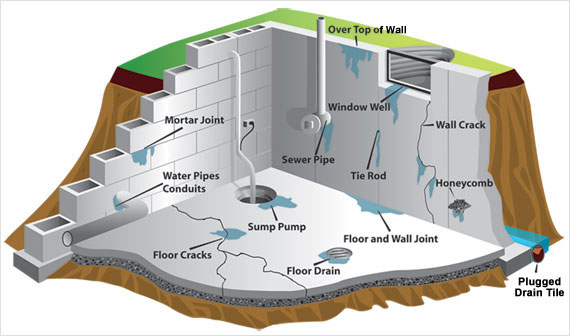What Is Basement Waterproofing?

Waterproofing is the act of preventing water from intruding into any material that is in contact with ground or moisture.
In any building construction, the basement is always in contact with the ground, and thus in contact with moisture.
In areas with high water table, the basement can be easily saturated with water seepage.
Without proper waterproofing, the concrete will readily deteriorate due to its ability to absorb moisture.
Moreover, if the basement of a building or structure is below the water table,
the hydraulic pressure forces the water to penetrate the basement’s floor and walls, and then water oozes out of cracks and seams in the concrete.
This, in turn, reduces the structural integrity of the concrete.
Before any building construction can start, structural engineers and geologists take special take consideration of the composition of the ground and the building design.
The geologists have to analyze the rock and soil composition of the ground where the building would be built.
Thereafter, the result of the geological analysis is studied by the structural engineer in order to make the necessary recommendations or rectifications with regards to waterproofing of the areas that will be in contact with the ground water.

Water is always present in the soil. It only varies in depth where it can be found.
Water is found where the water pressure is equal to the atmospheric pressure in the ground, or where there is zero pressure.
It is marked by the pronounced wetness below the ground level. It can be easily exemplified by the water level inside a deep well.
If the water table is close to the surface of the ground (high water table), the foundation and basement of the building to be constructed will be in constant contact with water and thus, needs to be waterproofed.
Furthermore, if the basement is deep and the ground is insufficiently ventilated, moisture can gradually degrade the masonry.
These conditions lead to the development of waterproofing techniques.
There are different types of applying waterproofing to the basement or the cellar of a house or a building depending on the rock/soil condition of the location where the house or building is built.
The most effective way of waterproofing is the exterior waterproofing method.
The exterior waterproofing method is the only method that the International Building Code (IBC) deemed to be satisfactory in preventing structural degeneration by water intrusion.
This method is done by placing perforated pipes to seep out and collect the water away from the building or house.
The next step is the application of tar or other asphalt-based material to the footer before pouring in the concrete for the structures foundation.
Likewise, the use of vinyl sheet to extend the waterproofing from the floor to the concrete walls of the excavation of a foundation and basement in combination with other materials is a worldwide practice.
Interior waterproofing is basically used to prevent moisture if the wetness is due to water condensation.
This method is also widely used to rehabilitate the basement once the exterior waterproofing method has been ruled out.
The use of interior sealants is another method of waterproofing. This method is generally used to seal off openings like cracks and pipe penetrations from the inside of the basement.
Sealants such as epoxies and other urethane based compounds are injected to the cracks and openings where the water from the ground can seep through.
The further advancement of technology created new waterproofing compounds, materials and adhesives. Its availability in the market insures that waterproofing materials will always be at hand.
License: Image author owned
Jan Van Fleet is a practicing Structural Engineer from the Netherlands.
He has worked as an assistant structural consultant for Aqua Master Plumbing and a quality control engineer in a prestigious structural design firm.
He is an expert in waterproofing of underground structures.
